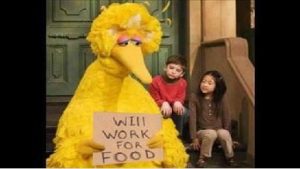
Mitt Romney had said, “I’m sorry Jim, I’m gonna stop the subsidy to PBS, I like PBS, I love Big Bird, I actually like you too [the moderator, Jim Lehrer had worked for PBS for decades], but I’m going to stop borrowing money from China to pay for things we don’t need.”
The responses from PBS seem perplexing if not contradictory. Kerger clarified that “In fact, the money that comes from the government into the Corporation for Public Broadcasting goes to our member stations,” suggesting that PBS itself doesn’t need government funding, but their written statement claimed that “while the federal investment in public broadcasting is relatively modest, the absence of this critical seed money would cripple the system and bring its services to an end.” Therefore, Kerger’s nonchalance should be disregarded — they do need the money.
Kerger’s bigger gripe was that PBS came up at all. “With the enormous problems facing our country, the fact that we are the focus is just unbelievable to me,” she said, taking a passing reference to be a main focus. She then claimed that PBS is “America’s biggest classroom,” and that the issue was “not about the budget. It has to be about politics.”
She had less to say about the public disapproval of Lehrer, who has been criticized for his moderating. Not an enemy of PBS, he was pardoned because “It was a very complicated debate structure,” as Kerger said.
The statement from PBS praised itself for “harnessing the power of media for the good of every citizen” — though in fact the concept of “television as classroom” is no substitute at all for the real thing. Their statement reads:
We are very disappointed that PBS became a political target in the Presidential debate last night. Governor Romney does not understand the value the American people place on public broadcasting and the outstanding return on investment the system delivers to our nation. We think it is important to set the record straight and let the facts speak for themselves. The federal investment in public broadcasting equals about one one-hundredth of one percent of the federal budget. Elimination of funding would have virtually no impact on the nation’s debt. Yet the loss to the American public would be devastating.
A national survey by the bipartisan research firms of Hart Research and American Viewpoint in 2011 found that over two-thirds of American voters (69%) oppose proposals to eliminate government funding of public broadcasting, with Americans across the political spectrum against such a cut.
As a stated supporter of education, Governor Romney should be a champion of public broadcasting, yet he is willing to wipe out services that reach the vast majority of Americans, including underserved audiences, such as children who cannot attend preschool and citizens living in rural areas.
For more than 40 years, Big Bird has embodied the public broadcasting mission – harnessing the power of media for the good of every citizen, regardless of where they live or their ability to pay. Our system serves as a universally accessible resource for education, history, science, arts and civil discourse.
[…]
Earlier in 2012, a Harris Interactive poll confirmed that Americans consider PBS the most trusted public institution and the second most valuable use of public funds, behind only national defense, for the 9th consecutive year.
A key thing to remember is that public television and radio stations are locally owned and community focused and they are experts in working efficiently to make limited resources produce results. In fact, for every $1.00 of federal funding invested, they raise an additional $6.00 on their own – a highly effective public-private partnership.
Numerous studies — including one requested by Congress earlier this year — have stated categorically that while the federal investment in public broadcasting is relatively modest, the absence of this critical seed money would cripple the system and bring its services to an end.

